Gardener Harold Hill: Cultivating Beauty and Community
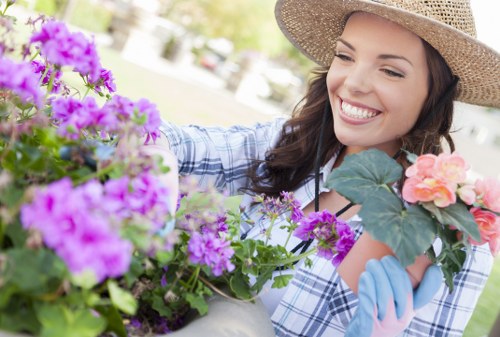
Who is Gardener Harold Hill?
Gardener Harold Hill is a celebrated figure in the gardening community, known for his exceptional skills in landscape design and sustainable gardening practices. With over 20 years of experience, Harold has transformed countless gardens, both private and public, into thriving, beautiful spaces that inspire and delight.
Harold's passion for gardening began at a young age. Growing up in a small town, he spent his childhood planting flowers, tending to vegetable gardens, and learning the intricacies of plant care from his grandparents. This early exposure ignited a lifelong love for nature and cultivation.
Today, Harold Hill is not only a skilled gardener but also an advocate for environmental sustainability. He integrates eco-friendly methods into his gardening practices, ensuring that his creations are not only beautiful but also beneficial to the environment.
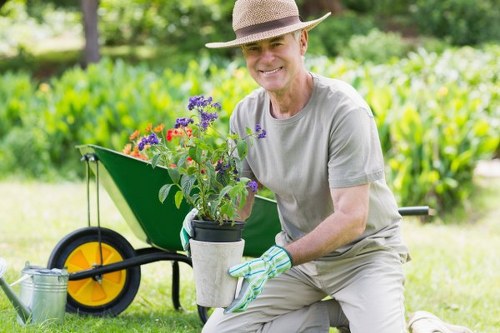
The Journey of Harold Hill
After completing his studies in horticulture, Harold Hill embarked on a career that would see him become a respected name in the gardening world. He started by working for various landscaping companies, where he honed his skills in plant selection, garden design, and maintenance.
Harold's dedication and expertise soon led him to establish his own gardening business. His unique approach, combining traditional gardening techniques with modern sustainability practices, set him apart from his peers. Clients appreciated his attention to detail, creativity, and ability to bring their visions to life.
Over the years, Harold has received numerous awards and recognitions for his contributions to the field of gardening. His work has been featured in several gardening magazines and he is a sought-after speaker at horticultural conferences.
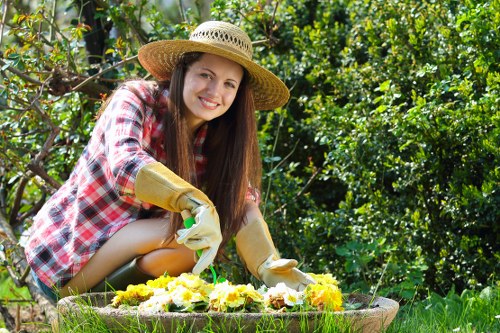
Gardening Philosophy
Harold Hill believes that gardening is not just about planting and maintaining plants; it's about creating a harmonious relationship between humans and nature. His gardening philosophy emphasizes sustainability, biodiversity, and aesthetic beauty.
"A garden should be a sanctuary where people can connect with nature," Harold often says. He strives to create spaces that are both functional and serene, providing a respite from the hustle and bustle of everyday life.
One of his core principles is the use of native plants. By selecting species that are indigenous to the area, Harold ensures that gardens are more resilient, require less maintenance, and support local ecosystems.
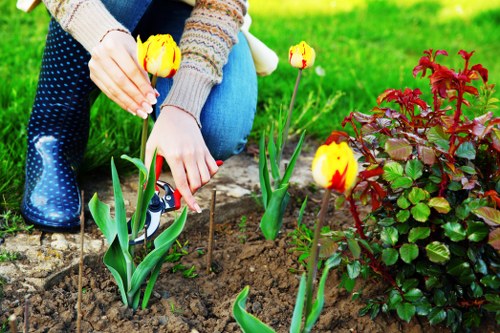
Signature Techniques
Harold Hill employs several signature techniques that make his gardens stand out:
- Permaculture Design: Integrating ecological principles into garden design to create sustainable and self-sufficient ecosystems.
- Vertical Gardening: Maximizing space and adding visual interest by growing plants vertically using trellises and other structures.
- Rainwater Harvesting: Collecting and using rainwater to irrigate gardens, reducing water usage and promoting sustainability.
- Companion Planting: Planting complementary species together to enhance growth, repel pests, and improve soil health.
These techniques not only enhance the beauty of the gardens but also ensure their long-term health and viability.
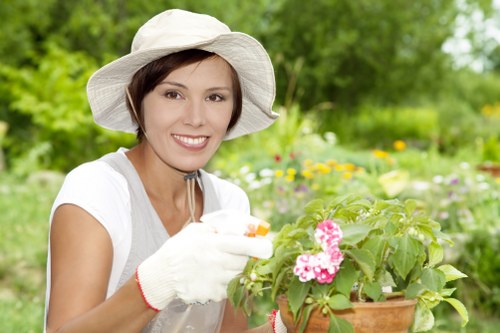
Community Impact
Beyond creating beautiful gardens, Harold Hill is deeply committed to giving back to the community. He volunteers his time and expertise to help local schools, community centers, and public parks develop green spaces that everyone can enjoy.
Harold organizes workshops and seminars to educate others about sustainable gardening practices. His efforts have inspired many to take up gardening, fostering a sense of community and environmental stewardship.
One of his notable projects includes the revitalization of the downtown park, where he introduced native plant gardens, walking paths, and educational signage to engage and educate visitors.

Gardening Tips from Harold Hill
Harold Hill shares his top gardening tips to help both beginners and experienced gardeners achieve success:
- Start with Good Soil: Healthy soil is the foundation of a thriving garden. Use compost and organic matter to enrich the soil.
- Choose the Right Plants: Select plants that are well-suited to your climate and soil conditions.
- Water Wisely: Water your plants early in the morning to reduce evaporation and prevent disease.
- Prune Regularly: Pruning helps maintain plant health and encourages robust growth.
- Encourage Biodiversity: Plant a variety of species to attract beneficial insects and promote a balanced ecosystem.
Implementing these tips can lead to a more productive and aesthetically pleasing garden.

Tools of the Trade
Having the right tools is essential for any gardener. Harold Hill relies on a combination of traditional and modern tools to maintain his gardens efficiently:
- Hand Tools: Essential for tasks like planting, weeding, and pruning.
- Power Tools: Used for larger tasks such as mowing, trimming, and tilling.
- Irrigation Systems: Automated systems that ensure plants receive consistent and adequate water.
- Soil Test Kits: To monitor soil health and nutrient levels.
- Composting Bins: For recycling organic waste into nutrient-rich compost.
Harold emphasizes the importance of maintaining tools regularly to ensure their longevity and effectiveness.

Challenges in Gardening
Despite his expertise, Harold Hill faces several challenges in gardening:
Pest Control: Managing pests without harming beneficial insects requires careful planning and the use of eco-friendly solutions.
Weather Variability: Unpredictable weather patterns can affect plant health and garden productivity. Harold adapts his strategies to mitigate these impacts.
Resource Management: Ensuring efficient use of water and other resources is crucial for sustainable gardening.

Success Stories
Harold Hill has numerous success stories that highlight his gardening prowess:
One notable project was the transformation of the local community center's neglected yard into a vibrant garden oasis. Harold designed a space that includes native plants, a vegetable garden, and a butterfly habitat, providing both beauty and practical benefits to the community.
Another success story involves a private residence where Harold created a drought-resistant garden that requires minimal water while still offering lush, colorful displays throughout the year.
These projects showcase Harold's ability to tailor his designs to meet specific needs and local conditions.

Future Endeavors
Looking ahead, Gardener Harold Hill has ambitious plans to expand his impact:
- Educational Programs: Developing comprehensive gardening courses to educate the next generation of gardeners.
- Urban Gardening: Promoting green spaces in urban areas to enhance city living and environmental health.
- Research: Conducting studies on sustainable gardening practices to contribute to the broader horticultural knowledge base.
- Collaborations: Partnering with environmental organizations to promote large-scale sustainability initiatives.
Harold is dedicated to continuing his mission of fostering a love for gardening and environmental stewardship in his community and beyond.

Local Areas Around Harold Hill
Gardener Harold Hill serves a variety of local areas, each with its unique features and gardening opportunities:
- Greenfield: Known for its botanical gardens and public parks, Greenfield is a hub for gardening enthusiasts.
- Maplewood: A residential area with beautiful suburban gardens that benefit from Harold's landscaping expertise.
- Sunnyvale: Features community gardens and urban green spaces that Harold has helped design and maintain.
- Oakridge: Offers diverse plant species and challenging terrains that Harold expertly navigates.
- Lakeside: With its proximity to water, Harold implements water-efficient gardening practices here.
- Riverside: Enhances riverside areas with native plants that support local wildlife.
- Pinehurst: Known for its pine trees, Harold integrates them into larger garden designs for a cohesive look.
- Brookfield: Hosts several of Harold's educational workshops on sustainable gardening.
- Willowbrook: Benefits from Harold's expertise in creating drought-resistant gardens.
- Elmwood: Features ornamental gardens and Harold's signature vertical garden installations.
Each of these areas benefits from Harold Hill's commitment to creating sustainable and beautiful gardens that enhance the community.

Environmental Sustainability
Environmental sustainability is at the heart of Harold Hill's gardening practices. He employs various strategies to minimize environmental impact:
- Organic Gardening: Avoiding synthetic pesticides and fertilizers to maintain soil health and protect wildlife.
- Water Conservation: Using drip irrigation and rainwater harvesting to reduce water usage.
- Composting: Recycling organic waste into nutrient-rich compost to enrich the soil naturally.
- Native Plant Selection: Choosing plants that thrive in the local climate and support local ecosystems.
- Energy-Efficient Practices: Utilizing solar-powered garden lights and tools to reduce energy consumption.
Through these practices, Harold ensures that his gardens are not only beautiful but also contribute positively to the environment.

Innovative Garden Designs
Harold Hill is renowned for his innovative garden designs that blend functionality with aesthetic appeal:
- Vertical Gardens: Creating lush, green walls that save space and add visual interest.
- Zen Gardens: Designing peaceful, minimalist spaces that promote relaxation and mindfulness.
- Edible Landscapes: Integrating vegetables, herbs, and fruit-bearing plants into ornamental gardens for both beauty and utility.
- Water Features: Incorporating ponds, waterfalls, and fountains to enhance the sensory experience of gardens.
- Pollinator Gardens: Planting flowers and herbs that attract bees, butterflies, and other pollinators to support biodiversity.
Harold's innovative designs not only enhance the beauty of gardens but also serve practical purposes, making them enjoyable and sustainable.

Educational Initiatives
Harold Hill is passionate about education and regularly conducts workshops and seminars to share his knowledge:
- Community Workshops: Teaching basic gardening skills to local residents.
- School Programs: Collaborating with schools to introduce gardening as part of the curriculum.
- Online Tutorials: Providing accessible gardening tips and techniques through online platforms.
- Mentorship Programs: Guiding aspiring gardeners and landscapers in developing their skills.
- Collaborative Projects: Partnering with environmental organizations to promote sustainable gardening practices.
These initiatives help foster a culture of gardening and environmental responsibility within the community.

Gardener Harold Hill's Legacy
Harold Hill's contributions to the gardening world extend beyond his immediate projects. His commitment to sustainability, education, and community building has left a lasting impact:
Through his innovative designs and sustainable practices, Harold has set new standards in the field of gardening. His work inspires others to adopt eco-friendly methods and appreciate the beauty of nature.
Harold's dedication to education ensures that his knowledge and passion will continue to influence future generations of gardeners. His legacy is one of beauty, sustainability, and community enrichment.
As he continues to work on new projects and share his expertise, Gardener Harold Hill remains a pivotal figure in cultivating both gardens and community spirit.

Conclusion
Gardener Harold Hill exemplifies excellence in the world of gardening. His unwavering dedication to creating beautiful, sustainable gardens and his commitment to educating and enriching the community make him a standout figure.
Whether you're a seasoned gardener or just starting out, Harold's insights and practices offer valuable lessons in cultivating both plants and community. His work serves as an inspiration to embrace nature, sustainability, and the joy of gardening.
As Harold Hill continues to nurture gardens and communities, his legacy will undoubtedly flourish, fostering a greener and more beautiful world for generations to come.

Frequently Asked Questions
1. What makes Harold Hill's gardening techniques unique?
Harold Hill combines traditional gardening methods with modern sustainable practices, such as permaculture design and vertical gardening. His focus on native plants and eco-friendly solutions distinguishes his approach.
2. How can I incorporate sustainability into my garden?
You can incorporate sustainability by using native plants, implementing water conservation techniques like drip irrigation, composting organic waste, and avoiding synthetic pesticides and fertilizers.
3. What are the benefits of having a native plant garden?
Native plant gardens require less maintenance, are more resilient to local climate conditions, support local wildlife, and promote biodiversity, making them environmentally friendly and sustainable.
4. Can Harold Hill help design a garden for a small urban space?
Yes, Harold specializes in designing gardens for various spaces, including small urban areas. He utilizes techniques like vertical gardening and container planting to maximize limited space effectively.
5. How can I learn more about sustainable gardening practices?
You can attend workshops and seminars conducted by experts like Harold Hill, participate in community gardening programs, and access online resources and tutorials focused on sustainable gardening.